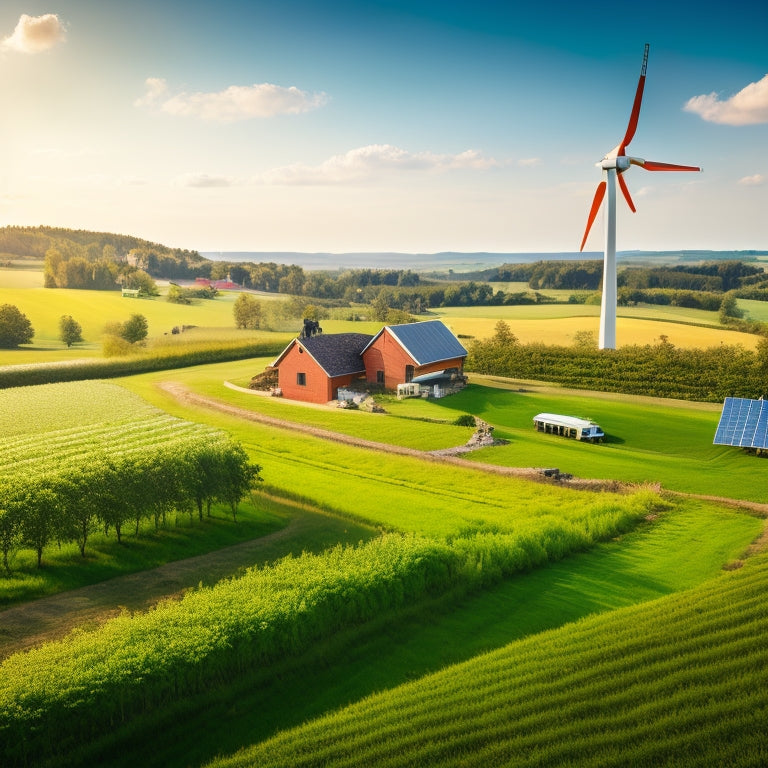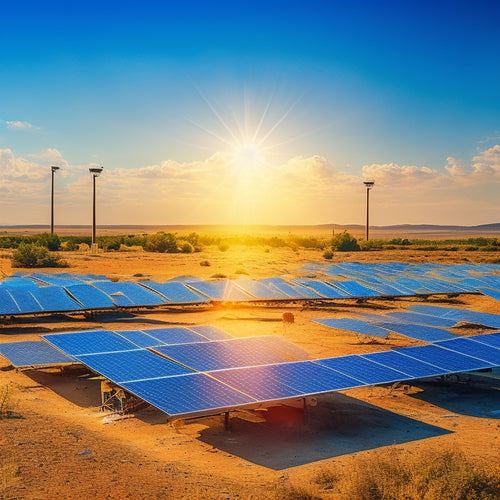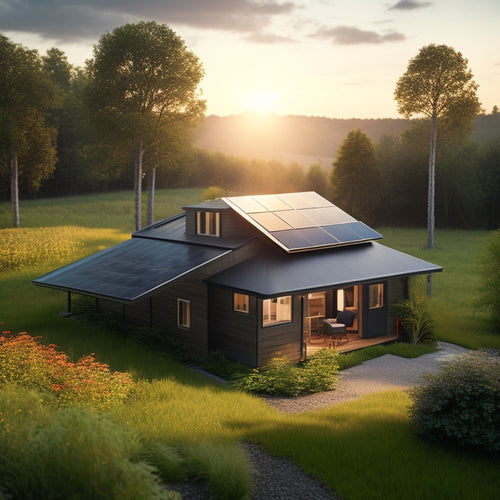
Empowering Rural Areas With Renewable Energy Solutions
Share
By integrating renewable energy solutions, you can enable rural areas, fostering entrepreneurship, and reducing reliance on external energy sources. Decentralized renewable energy systems provide reliable energy access, reduce diesel generator use, and enhance grid resilience. Sustainable energy solutions create opportunities for income generation, job creation, and drive agricultural innovations. As you explore renewable energy solutions, you'll discover how they can advance traditional power systems, revealing new possibilities for rural development and promoting sustainable growth. Now, explore how these solutions can be tailored to address the unique challenges and opportunities in rural areas.
Key Takeaways
• Renewable energy solutions empower rural areas by providing reliable access to electricity, fostering economic growth and social development.
• Decentralized renewable energy systems reduce reliance on diesel generators, enhancing grid resilience and promoting energy independence.
• Off-grid solar power systems provide a viable solution for remote communities, offering sustainable energy access and reducing energy poverty.
• Community engagement is crucial for successful rural electrification, promoting a sense of ownership and responsibility among community members.
• Renewable energy solutions drive agricultural innovations, create opportunities for income generation, and reduce reliance on fossil fuels.
Renewable Energy for Rural Development
Your reliance on renewable energy can be a game-changer for rural development, as it enables you to open up new possibilities for rural development. It allows you to leapfrog traditional fossil fuel-based power systems and establish a more sustainable, decentralized energy infrastructure.
This, in turn, can foster rural entrepreneurship by creating new opportunities for local businesses and individuals to develop and thrive. By harnessing renewable energy, rural communities can reduce their reliance on external energy sources, promoting energy independence and stimulating local economic growth.
Moreover, community engagement is essential in driving the adoption of renewable energy solutions. When local communities are involved in the planning and implementation process, they're more likely to take ownership of renewable energy projects, ensuring their long-term sustainability.
Off-Grid Solar Power Systems
By leveraging off-grid solar power systems, you can provide reliable and sustainable energy access to rural communities, allowing them to operate independently of the grid. These systems are designed to generate electricity from sunlight, storing excess energy in batteries for later use. Effective system design is vital to guarantee a reliable and efficient supply of energy.
| Component | Description | Importance |
| Solar Panels | Convert sunlight into electricity | High |
| Battery Bank | Stores excess energy for later use | Medium |
| Charge Controller | Regulates energy flow to batteries | High |
To guarantee peak performance, regular battery maintenance is essential. This includes monitoring state of charge, voltage, and temperature to prevent battery degradation. By doing so, you can extend the lifespan of your off-grid solar power system and minimize downtime. Proper system design and battery maintenance can provide rural communities with a reliable source of energy, empowering them to thrive in the absence of grid connectivity.
Energy Access for Remote Communities
Rural communities lacking grid connectivity often struggle to access energy, hindering their economic and social development. You might be surprised to learn that approximately 840 million people globally lack access to electricity, with many more facing energy poverty. Energy poverty is a significant obstacle to development, as it limits access to healthcare, education, and economic opportunities.
Remote communities, in particular, face unique challenges in accessing energy due to their geographical isolation. Island grids, which are isolated electrical grids that operate independently of the main grid, can provide a viable solution for remote communities. By leveraging renewable energy sources, such as solar, wind, or hydro power, island grids can provide reliable and sustainable energy access.
This approach allows communities to generate their own energy, reducing reliance on expensive and polluting diesel generators. As you consider energy access for remote communities, it's essential to prioritize sustainable solutions that address energy poverty and promote economic development.
Rural Electrification Through Renewables
As you explore alternatives to traditional grid extension, decentralized renewable energy systems emerge as a promising solution for rural electrification. These systems, such as solar home systems, mini-grids, and wind power, offer a reliable and sustainable means of energy access. By leveraging local renewable resources, you can reduce reliance on diesel generators and mitigate the environmental impact of energy production.
Decentralized renewable energy systems also enhance grid resilience by reducing the strain on the main grid. This, in turn, improves the overall reliability of the energy supply.
Additionally, community engagement plays a crucial role in the success of rural electrification projects. By involving local stakeholders in the planning and implementation process, you can make certain that the energy solutions are tailored to meet the specific needs of the community.
Through community-based initiatives, you can foster a sense of ownership and encourage the adoption of renewable energy technologies. This collaborative approach not only promotes energy access but also contributes to the social and economic development of rural areas.
Sustainable Energy for Rural Growth
You can stimulate rural growth by leveraging sustainable energy solutions, which not only provide reliable access to electricity but also create opportunities for income generation and job creation. By adopting renewable energy sources, rural areas can reduce their reliance on fossil fuels and mitigate the impact of climate change. This, in turn, can lead to improved agricultural productivity and enhanced community engagement.
| Sustainable Energy Benefits | Rural Growth Outcomes |
|---|---|
| Reliable Energy Access | Increased Agricultural Productivity |
| Reduced Energy Costs | Enhanced Community Engagement |
| Job Creation and Income Generation | Improved Rural Livelihoods |
Sustainable energy solutions can also drive agricultural innovations, such as precision farming and irrigation systems, which can increase crop yields and improve resource allocation. Moreover, community engagement and participation in renewable energy projects can foster a sense of ownership and responsibility, leading to more sustainable and resilient rural communities. By embracing sustainable energy solutions, rural areas can tap into their full potential and drive growth, development, and prosperity.
Frequently Asked Questions
How Do Renewable Energy Solutions Impact Local Food Production and Agriculture?
As you explore renewable energy solutions' impact on local food production, you'll find that farm-to-table initiatives thrive with agricultural innovations, efficient irrigation systems, and increased crop yields, ultimately boosting rural economies.
Can Renewable Energy Systems Be Designed for Extreme Weather Conditions?
You can design renewable energy systems to withstand extreme weather conditions by integrating weather resilience and climate adaptation features, ensuring uninterrupted power supply and minimizing risks associated with natural disasters.
What Role Do Community Engagement and Education Play in Rural Energy Projects?
You understand that community engagement and education are essential in rural energy projects, as they promote local partnerships and cultural sensitivity, ensuring that solutions are tailored to specific needs and values, ultimately driving project success.
How Do Renewable Energy Solutions Affect Property Values in Rural Areas?
As you consider investing in rural areas, you'll find that renewable energy solutions can boost property values by preserving rural aesthetics, but may also lead to energy sprawl, land scarcity, and visual impact, affecting property taxation and investment potential.
Are There Any Government Incentives for Rural Renewable Energy Initiatives?
You'll find that government incentives for rural renewable energy initiatives include Rural Subsidies and Energy Grants, which can greatly offset project costs, making sustainable energy more accessible and financially viable for rural communities.
Related Posts
-

Solar Phone Chargers for Camping Essentials
Solar phone chargers are must-haves for your camping essentials, allowing you to stay connected while enjoying nature...
-

What Happens Without a Charge Controller in Solar Panels
Without a charge controller in your solar panel system, you risk overheating batteries due to overcharging, which can...
-

Diy Off Grid Solar
By embracing DIY off-grid solar, you can break free from grid dependence, slashing your energy bills by up to 90% and...


